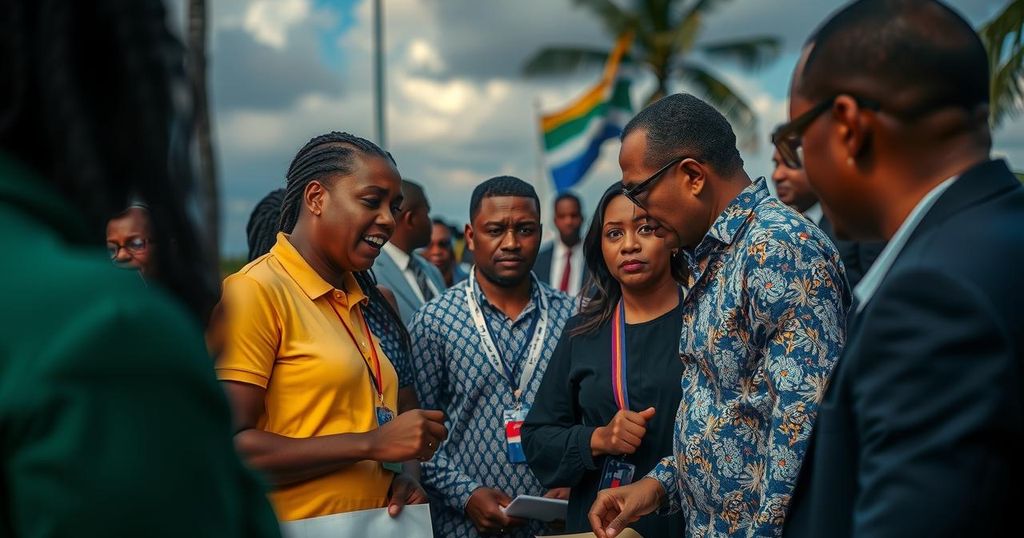Mauritius Elections: Navigating Allegations and Political Turmoil
Mauritius is conducting its 12th national election amid a serious wiretapping scandal involving high-ranking government officials. Approximately one million eligible voters are expected to participate, and the political climate has been tense due to leaked recordings that have sparked national indignation. Key issues include high living costs, crime, corruption, and governance quality, all impacting the electoral landscape in significant ways.
Mauritius, a stable democracy in the Indian Ocean, is preparing for its 12th national election amid significant turmoil resulting from allegations of government wiretapping. Approximately one million eligible voters will participate in the elections, which are traditionally characterized by high turnout rates close to 80 percent. However, the current electoral landscape has been disrupted by a scandal involving leaked recordings that suggest misconduct among high-ranking officials, leading to a heightened sense of urgency and pressure. The wiretapping allegations surfaced through a TikTok account, which purportedly released audio recordings implicating numerous politicians in discussions about members of the opposition, police, and journalists. Prime Minister Pravind Kumar Jugnauth, who is seeking re-election, has initiated a judicial investigation while claiming that the recordings may have been manipulated. This scandal has intensified political tensions, particularly after a social media ban was imposed to safeguard national security, only to be reversed shortly thereafter amid public outcry. As Mauritius approaches the elections, voters are tasked with choosing members for the National Assembly from a spectrum of political parties. These parties, including the Militant Socialist Movement (MSM), the Labour Party, and the Mauritius Militant Movement (MMM), frequently form alliances to secure a parliamentary majority. The MSM, led by Jugnauth, enjoys considerable support, buoyed by an economic recovery post-COVID-19, but faces criticism over high commodity prices. In contrast, the Labour Party and its allies vie for power, with leader Navin Ramgoolam focusing on addressing the wiretapping scandal and promising regulatory reforms. Additionally, concerns regarding rising living costs and crime, particularly drug abuse, have emerged as critical issues in the elections. Moreover, public disenchantment related to governance and transparency has been exacerbated by the ongoing wiretapping allegations. As voters prepare to make their electoral choices, salient factors such as high living costs, crime, and government accountability will undoubtedly shape the outcomes, bringing significant implications for Mauritius’s democratic future and socio-economic framework. The outcome of this election could potentially redefine the country’s political landscape, setting precedent for governance and national integrity.
Mauritius, which gained independence from Britain in 1968, has remained a paragon of parliamentary democracy in Africa, conducting its 12th national election. However, this election is punctuated by serious allegations of a government wiretapping scandal, which has generated considerable public agitation and political tension. Leaked audio recordings have implicated high-ranking officials in questionable practices, raising significant concerns among citizens, and triggering debates about governance and accountability in Mauritius. Furthermore, the country’s economic standing, buoyed by diverse sectors such as manufacturing and pharmaceuticals, contrasts sharply with other regional nations, marking it as a notable player in African politics. This backdrop of socio-economic resilience, coupled with emerging political turmoil, forms the basis for the stakes involved in this election.
In summation, the Mauritius election unfolds against a backdrop of serious allegations of governmental misconduct through wiretapping, igniting fierce national debate. While traditional electoral processes exhibit robust participation and competitiveness, current political dynamics are uniquely challenged by public concerns regarding governance, economic stability, and social equity. The final outcome will reflect not just electoral preferences but also a pivotal moment in the evolution of Mauritian democracy, shaping both governance and future political engagement in the nation.
Original Source: www.aljazeera.com




Post Comment